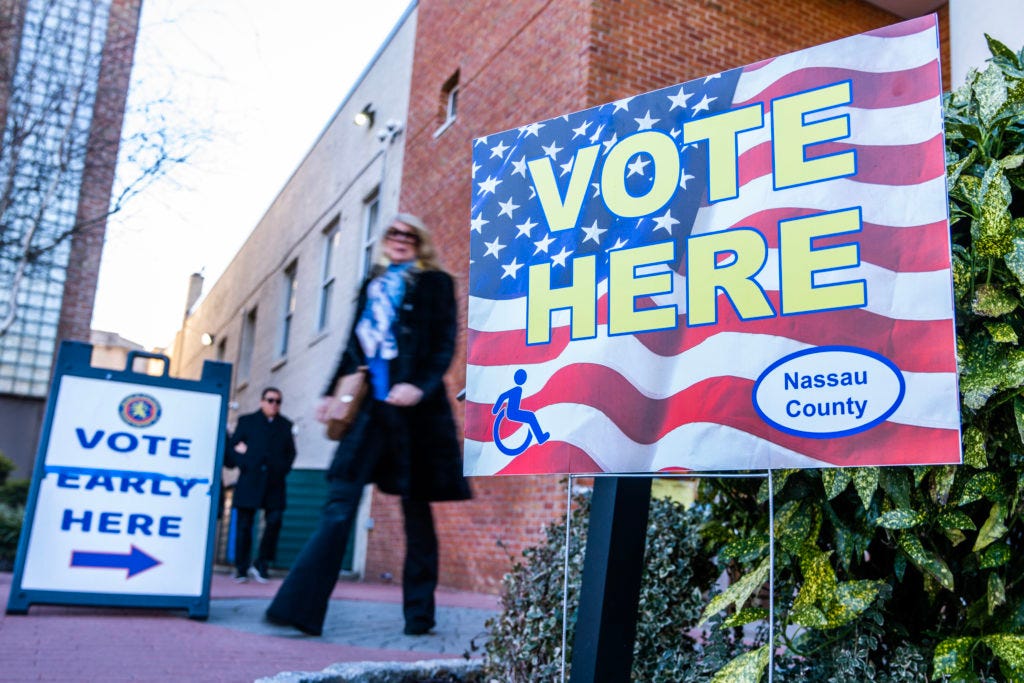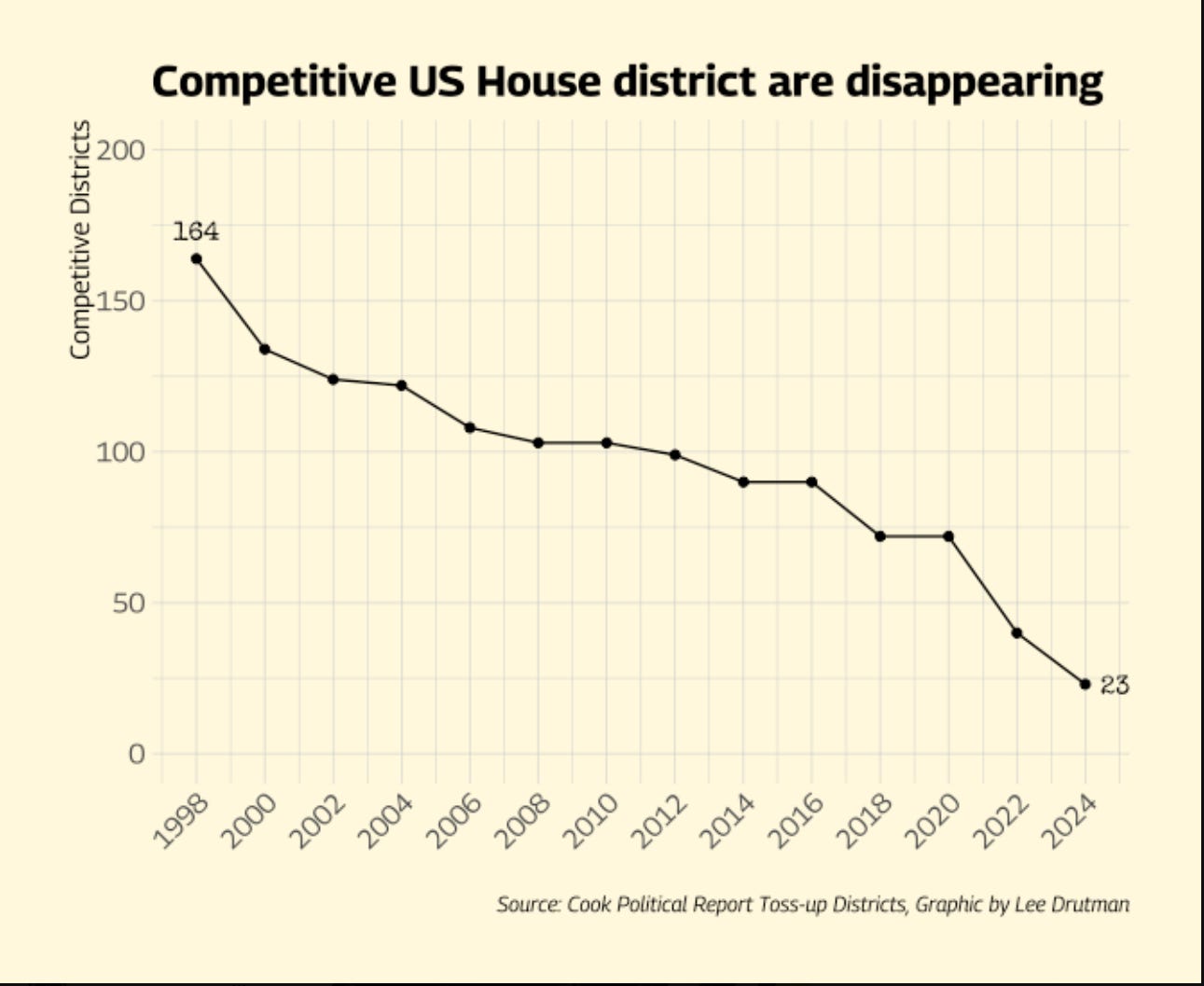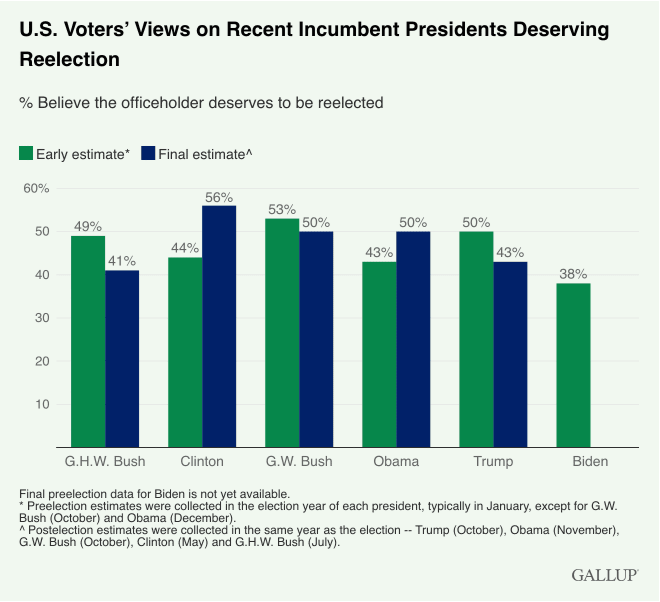Welcome to Chris Crucial. The goal of this nightly post is to bring you up to speed on what you missed in the day that was in politics. I’d love for you to become a member of the community we are building here. This year is a critical one for our democracy — and I hope I can count on your support! 🙌
1. Democracy dies in non-competitiveness: Today is the House special election to replace expelled GOP Rep. George Santos in New York’s 3rd district. It’s a competitive race between former Democratic Rep. Tom Suozzi and Republican county lawmaker Mazi Philip. Polling suggests the race is close — and both parties are looking at the voting for signs of whether the wind is at their backs or in their faces moving into the heart of the election year.
If you want to track election results, do it here. (The polls close at 9 pm eastern time.)
But, regardless of who wins tonight in New York, the 3rd district is part of a dying breed: The competitive House seat. (Santos won the seat by 8 points in 2022; two years earlier Joe Biden carried it by a similar 8 points.)
This chart, based on ratings by the nonpartisan Cook Political Report with Amy Walter, tells the story of the decline of competitiveness in the House:
There were 164(!) competitive House districts in 1998! Less than 30 years later, there are 23. Doing some quick math that means there are 86% LESS competitive districts today than there were 20 years ago. And that of the 435 House districts up for grabs in November, only 5% of them are truly competitive.
We know why this is.
First, the last three redistricting cycles — 2001, 2011 and 2021 — have seen both parties work to a) shore up their incumbents and b) eliminate competitive seats. Second, we are in the midst of great self-sort — as people move to communities, cities and states where they are among others who share their ideological views.
We also know that this is a bad thing for democracy. Why? Because non-competitive districts in a general election mean that the real race for the seat is only in the primary (Democratic or Republican). And, because of that fact, candidates are incentivized to cast themselves as far out on the ideological extreme as possible — to appeal to rigidly ideological primary voters. Which, if that candidate wins (and they often do), means that they have NO interest (or political incentive) in working with people from the other party or even the more moderate wing of their own party.
Competitive general elections produce candidates who have as their imperative finding ways to bipartisan solutions that address problems. A lack of competitive general elections produce exactly what we have: Legislative gridlock.
2. This week is VERY big in the Trump trials: The truth of Donald Trump’s legal situation is that there are SO many cases (and SO many charges) that it’s often very difficult to keep track of them all. (Trump, by the way, benefits from that fact.)
But, you need to circle the end of this week as potentially HUGE. As the New York Times noted today:
In two courthouses, two blocks apart, two New York judges could well ruin Donald J. Trump’s week.
On Thursday, one of the judges, Juan M. Merchan, may schedule the first criminal trial of a former American president for as early as next month — raising the specter that Mr. Trump might end up behind bars.
The following day, according to two people with knowledge of the matter, the second judge is expected to deliver a ruling that threatens not Mr. Trump’s freedom, but his family business.
The first trial is on whether Trump made illegal hush money payments to porn star Stormy Daniels to keep their alleged extramarital affair quiet in the run-up to the 2016 election. Trump was indicted in 2023 on 34 counts of falsifying business records — as he allegedly paid back one-time fixer Michael Cohen, who paid off Daniels.
The second legal ruling would come from Judge Arthur Engoron who is tasked with deciding the financial penalty Trump will pay for years of over-inflating his assets and net worth as a way to secure more favorable loan conditions. New York Attorney General Letitia James has asked for Trump to be fined $370 million, a massive sum that the real estate billionaire could struggle to pay.
Now, neither of these rulings will — I think — fundamentally alter the trajectory of the 2024 race. For most people, these rulings are background noise. Only the people paying very close attention — who have, in the main, already made up their minds — will care deeply about these rulings.
But adverse rulings are likely to enrage Trump. And he’s not going to be quiet about it.
3. Kari Lake, establishment candidate: Kari Lake lost the 2022 Arizona governor’s race, a fact that she has never acknowledged — choosing instead to pursue a series of unsuccessful legal challenges. (Sound familiar?)
That, apparently, has not gotten in the way of her future political ambitions. (Amazingly!). On Tuesday, Montana Sen. Steve Daines, who runs the Republican campaign committee, threw his support behind Lake.
“Kari is building out an effective campaign operation that has what it takes to flip Arizona's Senate seat in November,” Daines said in a statement. “I’m proud to endorse Kari Lake for United States Senate.”
Which is something! Because Lake is not the only candidate running for the Republican nomination. Mark Lamb, the sheriff of Pinal County, is also in the race — although he is far less, well, Trump-y than Lake. (It would be hard to be MORE Trump-y than Lake.)
Even before the Daines’ endorsement, Lake was the near-certain GOP nominee. (She is likely to face Democratic Rep. Ruben Gallego and, maybe, independent Sen. Kyrsten Sinema in the general election.)
But by putting their thumb on the scale for Lake — who, again, is one of the leading election deniers in the country — establishment Republicans made clear, again, that this is Trump’s party. Period.
NOTABLE QUOTABLE
“If your position is being cheered by Vladimir Putin, it's time to reconsider your position.” — Utah Sen. Mitt Romney to his GOP colleagues who opposed a bill sending financial aid to Ukraine. (The measure passed the Senate 70-29.)
ONE GOOD CHART
A smaller percentage of the electorate believes that Joe Biden deserves to be reelected than have said the same about his five immediate predecessors, according to new Gallup data.
SONG OF THE DAY
I first got to know Phosphorescent a decade ago when he (Matthew Houck) released “Song for Zula.” It was a SMASH hit. (It’s been listened to more than 112 million times on Spotify.) I’ve loved his music ever since — including his new one “Revelator.”







A big part of the reason we are so polarized is that our politicians know that they don’t have to compromise. Their seat is safe, and the only real threat they face is if someone more extreme than them runs against them in the primary.
The only way to fix the problem...or at least lessen it's impact...would be to use a grid style method of districting, with all 50 states using the same method. (Picture a chess board superimposed over the map.)
Letting states gerrymander at will is antithetical to a fair democratic system.